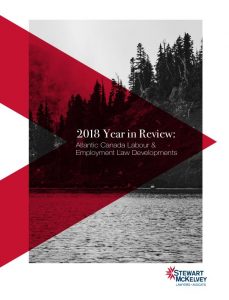2018 Year in Review: Atlantic Canada Labour & Employment Law Developments
We can all make 2019 a success by building on the year that was. For employers, 2018 was a year of many notable developments in labour and employment law across the country. We saw Ontario enact significant legislative changes only to roll many of them back following a turnover in government; the federal government propose significant changes to its own legislation; the #metoo movement march forward; and the legalization of cannabis put its workplace impact in the spotlight.
Atlantic Canada experienced a number of its own legal developments that regional employers should be aware of as they plan for the year ahead. Click the image below to read our 2018 Year in Review, where lawyers from the Labour & Employment practice group recap notable legislative and case law updates from each of the four Atlantic provinces.
Archive
By Kevin Landry On November 9 2023, Bill C-365, An Act respecting the implementation of a consumer-led banking system for Canadians (“C-365”), short titled as the ‘Consumer-led Banking Act’ was read in the House of…
Read MoreBy Jennifer Taylor The Nova Scotia Court of Appeal (“NSCA”) has issued an important decision clarifying the test to disallow a limitations defence. The decision, Halifax (Regional Municipality) v Carvery (“Carvery”), has real implications for personal…
Read MoreBy Deanne MacLeod, K.C., Burtley Francis & David Slipp On September 21, 2023, the Federal Government introduced Bill C-56: An Act to amend the Excise Tax Act and the Competition Act (“Bill C-56”), with the…
Read MoreBy Nancy Rubin, K.C. and Lauren Agnew The long-awaited Green Choice Program Regulations (N.S. Reg. 155/2023) were released by the provincial government on September 8, 2023, offering some clarity into the practical implementation of Nova…
Read MoreBy Koren Thomson, John Samms, and Matthew Raske The Newfoundland and Labrador Court of Appeal has held that the Information and Privacy Commissioner for this province (the “Commissioner”) does not have the authority to order…
Read MoreBy Perlene Morrison, K.C. Municipalities are required to pass code of conduct bylaws in accordance with section 107 of the Municipal Government Act (the “MGA”). Subsection 107(1) of the MGA specifically states that a municipality’s…
Read MoreBy Sheila Mecking and Kathleen Starke On August 23, 2023, the Ontario Superior Court (“ONSC”) upheld a complaints decision which ordered a psychologist to complete a continuing education or remedial program regarding professionalism in public…
Read MoreBy Dante Manna As we advised in a previous podcast, all federal employers with at least ten employees[1] have been subject to the Pay Equity Act [2] (“PEA”) and Pay Equity Regulations [3] (“Regulations”) since…
Read MoreBy Nancy Rubin, K.C. Environment and Climate Change Canada (ECCC) recently published a draft of the Clean Electricity Regulations (CER). The proposed Regulations work toward achieving a net-zero electricity-generating sector, helping Canada become a net-zero…
Read MoreBy Stephen Penney & Matthew Raske In the recent decision Index Investment Inc. v. Paradise (Town), 2023 NLSC 112, the Supreme Court of Newfoundland and Labrador validated the Town of Paradise’s decision to rezone lands…
Read More